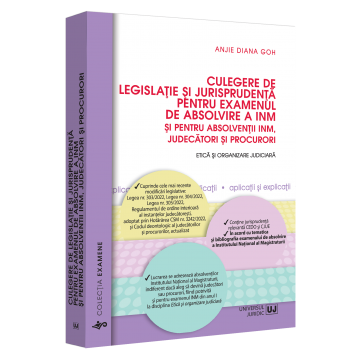Publisher: Editura Universitară
Author:
ISBN: 978-606-28-0656-9
DOI: 10.5682/9786062806569
Publisher year: 2017
Pages: 252
- Description
- Download (1)
- Authors
- Content
- More details
- Reviews (0)
In relation to the ideal of peace and the values of humanism, research on the international scene is attentive with the character and content of norms and with the relationship between morality (to affirm what is Good for humanity) and what is fair, right for the actors who act at a given moment of the evolution of the things.
The normative action which prevents wars or which endeavors to limit the recourse to arms and, through negotiations, to return to the situation of peace becomes important. Remains in topicality, for the politico-legal doctrine the dispute between idealism and realism in the exegesis of international relations. What is certain is the fact that the intermediary of law expresses both the character of the balance of power and the aspiration to structure a world of peace.
This mission of studying the rules of law, the way of their development, their institutionalization and application, their consequences, has always been assumed by international law but depending on historical data and the cultural context it has known expressions various theoretical. The processes that take place in the international science force the law to adapt, to retain from the past what is really lasting but also to set the standards for what has brought: the collapse of communism, the affirmation of new centers of power, the development of flows and relations that shape globalization and globalization, the fact that all the agents on the scene act in networks. New theoretical concerns are also added to traditional ones, which obliges exegesis to open new chapters of discussion, to seek new ways so that the law can respond in a more flexible manner to the challenges of real international life.
This is the reason why a group of researchers from Harvard University proposed "a new approach" to international relations, based on the proposals of deconstructivism, of a critical mind and at the same time of an emerging interdisciplinary perspective. at the end of the century to the idea that international law proposes norms, rules which are not neutral but on the other hand are instrumentalized, which requires a permanent reinterpretation.
The Harvard school proposed to take a look at the so-called traditional approach of public international law marked by legal positivism and jus naturalism and then by pragmatism and functionalism. In fact, in the United States, the attention of researchers in the human sciences has always been, in the twentieth century, turned towards the processes in which the agents of social and political life are engaged, taking into account a certain institutional and regulatory framework. . In this case the inspiring philosophy was marked by the liberal spirit for which international law should be a regulating factor of international relations by its rationality, supported by an international institutional system capable of imposing it.
On the other hand, in the name of deconstructivism, it is affirmed that public international law is the result of the wills of the actors of international science who carry their subjective values, which are basically irreconcilable. Hence the concern of this orientation to reveal the meaning of the languages used by jurists, the “operational fictions” which allow the affirmation of a neutral character of the legal norm.
Consequently, we cannot speak of a generally accepted public international law and we must speak of pluralism in the matter of schools.
“International rights” that vary according to the legal culture specific to each international actor.
It is necessary to intervene at this point of the discussions to make some clarifications. Public international law and first of all a study of a set of standards, or more generally of formulas for codifying the behavior of agents on the international scene, which are identifiable iables (have an identity) by their culture, by their interests and values, which are recognized as such, that means, have the recognition of other agents in their capacity as participants in the creation of law. The simple desire to want to participate in the creation of international law is not enough. There is also the fact that the creation of the norms of public international law and the result of the negotiations of the sovereign agents who arrive at a compromise and which is materialized in a written form. The basic task of public international law is to study this legal order and its capacity to regulate the behavior of actors on the international scene, subjects and institutions created on this basis.
Public international law gains a certain specificity in relation to other legal orders (internal, for example or created by various cultural, religious or other "internationals"). Globalization and globalization have given birth to a diversity of actors on the international scene but the State remains the “privileged” subject because it is invested with the mission of organizing and directing the life of a human community which has its own identity.
But E. Turme-Jouannet rightly observes that “current developments show that more and more actors in internal and international relations tend to become subjects of international law (to have international legal personality; i.e. those who are beneficiaries of rights and obligations under international law), a sign of the growing legalization of international society.
Hence the idea that the discussions in the literature devoted to this subject must give way to a new understanding of what the actor on the international scene is because the idea that a subject of law is only one who has the capacity to create law, to be sovereign and to be the recipient of norms is overtaken by the facts. In this sense, we invoke private economic actors, "multinationals" and civic actors (associations, foundations, unions) who develop standards having the force of law, in particular for human rights. But, the fact that there are agents who have the capacity to act according to their own rules does not eliminate the idea of state sovereignty and we have enough examples in international life today. which prove that the State is coming back in force to keep the interests of a community with identity, against the excesses of globalization and globalization.
The multiplication of methods of standardizing international relations does not contradict the determination of public international law but raises the problem of the hierarchy of norms. This concept was introduced by Hans Kelsen to go beyond the situation created by the multitude of legal norms and by the intrusion of criteria external to the law (moral and political but also religious) to build an organic vision on the law. From here the idea of a system of norms between which he introduced the hierarchy. There is a basic assumption which has its roots in the way of being of an organized society and in its vision on the law in which the fundamental norm is built. From them derive, in a cascade, norms which must respect the fundamental norm. There is a block of norms called "conventionality" which makes up international law which is a positive construction by negotiation (treaties, conventions excluding customs) then the norms of community law (treaty and secondary law) and and finally the standards which have provisions applicable in domestic law having as their object the condition of private persons (human rights, labor, environmental, banking, administrative and business law). We can notice the fact that in today's world, a consequence of internal laws is imposed, which is the result of negotiations between the interested subjects but also a harmonized application of standards within States.
In our opinion the concept of hierarchy of norms helps us to put an order both on the vertical dimension and under the horizontal dimension of the various forecasts, to give them a certain coherence. The observation gains in significance if one takes into account the fact that international society is anarchic, that there is no center of international legislative power, and that international instruments to apply international law exist are lacking. We are talking about a transnational legal regime to regulate “international” questions in specialized fields (sport, IT) and also of a mixed legal order, neither monist nor dualist.
There are opinions that one can abandon discussions of the legal order and the hierarchy of norms and use the term "space legal "or that of" networks of standards "to designate standards developed by subjects who are in networks. But the real problems concerning the situation of public international law lie in the means and modalities of applying its standards. Which authority can be called upon under the new conditions, both for development and for application, to validate or to sanction compliance with and non-compliance with standards? For the effectiveness of the law, for it to be an instrument of world order, in the last instance it is necessary to appeal to States or to organizations created by States, which are the only ones able to impose (through the monopoly of use of force) respect for the norm. Another aspect which must be discussed is linked to the fact that the main source of public international law is the Treaty, either to regulate bilateral relations (on the political, military, economic, cultural level) or for multilateral relations. The Treaty expresses in a written form (regardless of its name) that is to say "materialized" an agreement, a contract. This imposes on the contracting parties their capacity to contract obligations and responsibilities and therefore it cannot be imposed against the will of a subject of international law or on a party which does not participate in the contractual relationship.
This observation allows us to affirm that, even if there are many subjects of public international law, it is only the State which is able to fulfill the criteria of validity of a contract. On the other hand, this contract between subjects who do not have the recognized status of subjects of international law is not a Treaty. When two heads of state announce an agreement, it is not necessarily a Treaty because it has not gone through the state procedure that establishes duties and responsibilities. Many discussions raise the ways in which we arrive at the conclusion of international treaties. These are first of all the steps that must be taken for a treaty to enter into force, usually being considered four steps.
the elaboration of the Treaty is a stage where negotiations are important. We are convinced that negotiations are present in all areas of social life as a typically human fact, by which we go beyond the laws of nature by the laws of culture, according to an expression consecrated in the specialized literature. It is a means of regulating social relations by the production of rules and by the determination of agreements on their content and on their methods of being applied, it is the recognition of dialogue as a social binding. Negotiation is a way to humanize the life of man and his communities, because it replaces violence and war. We add to this observation that even for wars, there are rules, a law of war and a law which prohibits wars in the relations between states. There is therefore the cultural imperative to negotiate what a spiritual dimension supposes (values, ideologies, doctrines, wills, ideals) and an important presence of institutions. The negotiations to conclude the Treaties engage the responsibility of those who discuss it and therefore in the name of the sovereignty of the agent it is him that he confers a mandate to negotiate. It is said that in the international scene there are various actors who can negotiate international agreements.
For example, after negotiations between a transnational company and local authorities, in Cluj, a production unit was placed. At some point the company made the decision to relocate. Because the contract was drawn up with a certain enthusiasm, we did not foresee the consequences that could happen in such a case, especially in matters of social assistance (stubble, pensions, health) leaving to the Romanian State all the responsibility. . the modalities by which States express the fact that their consent has been bound. The history of the negotiations has shown that some negotiators ignored their mandate or that there are wording flaws, such as the expression of content flaws. To the need to give the agreement of the contracting parties a solemn character respond to the ratification procedures (from the Latin ratum facere = to make valid).
The entry into force is important for the speed to obtain the results of the Treaty (sometimes we can postpone the entry into force as the expression of bad faith, or when it comes to multilateral Treaties we are used to to provide for a certain number of ratifications for the Treaty to be considered in force).
There is also discussion of a provisional application of a Treaty when the State has taken on international obligations but has not introduced the necessary changes into domestic law. For example, after joining Unio n European, a country can ask for a period during which the assumed obligations are fulfilled.
the validity and the effects of the Treaties are two subjects which have been the subject of much ink in exegesis. First it is the capacity to assume the Treaties, then are the errors of form (imperfect ratification) and of substance (fraud, violence, injury) and then the respect of ius cogens (article 53 of the Vienna Convention on Treaty Law). It is the State which assumes the effects of the Treaties by matching their forecasts with those of domestic law, and it is the State which formulates the reservations.
These considerations help us to understand the quality of the scientific approach accomplished by the book of Mrs. Diana-Ionela Anches, which is called with unjustified modesty "introduction", because in fact, it is devoted to all the major themes of reflection on public international law which are presented in a synthetic manner by calling out ideas and not words, having their own logic, a sequence of arguments which allows us to truly understand the basic cores of a discipline in which there is no lack not exegesis, but also scientific debates in meetings and in journal articles. Beyond the wealth of references, the author has found her own thread to link the themes without being impressed by the prestige of the references or by the greatness of the actors who want to impose a certain way of judging the events of the international scene.
The personal perspective is supported by an idea that keeps its weight in all discussions about what is happening in the contemporary world: it is the idea that the law remains the most solid benchmark for building relationships on a planetary scale. even if we try to consider morality as a regulating factor or religion. It is true that there is a close connection between philosophy, morals and politics which must provide an understanding of what is happening on the planet, but to set up a real organization of international relations it is necessary to develop and apply firm international law.
From this point of view is exceptional the position of Pope Francis who, in his positions, denounces planetary inequities to evoke the fact that humanity still has the capacity to fight to build our "common home" because it becomes essential to create a normative system that involves the formulation of insurmountable limits before the new forms of power derived from the techno-economic paradigm end up destroying not only politics but also freedom and justice. We must build leaderships that chart paths by seeking to meet the needs of current generations by including everyone, without harming future generations. A new ethic of international relations is imposed. The book written by Mrs. Diana Ionela Anches starts from the idea that the law wants to introduce a normative order in international relations, as a factor of social organization. He insists on the fact that the action of law is complex insofar as it is at the same time prescriptive, prohibitive or permissive and its mission is more complex in the conditions in which new actors have appeared on the scene, we use a new conceptual apparatus and public international law is not the only instrument of intervention on realities.
The author is committed to presenting the divisions of public international law, its object is its specific characteristics. It is engaged in a very clear analysis of the relationship between international law and domestic law to convey the idea that, in the processes of globalization and globalization, the latter must make efforts to adapt to demands of the great planetary commandments. It seems to me very important the debate proposed by the book on what should be international jurisprudence as a sign of the awareness of the need to have standards that are applied on a human scale.
The insistence on the role of the Treaties, their sources, their conditions of validity, the interpretation (even the methods used), the guarantees of the execution, the effects, the extension, the unilateral acts which affect them proves a spirit scientist of great competence. I also appreciated the debates offered to us on questions of territory, population, resources, citizenship, and international organizations.
A chapter has been dedicated, rightly, to a few themes devoted to diplomatic law to remind us that the author has signed a very special book devoted to mediation, unique at the time of its appearance.
This is a book that is not only useful, because it is topical, but also generates challenges. bats, full of suggestions that comes from a professional spirit that imposes itself.
Teacher. Dr. Liviu-Petru Zapartan
-
INTRODUCTION À LA THÉORIE DU DROIT INTERNATIONAL PUBLIC
Download

Diana-Ionela Anches is a university lecturer at the "Vasile Goldis" University of Arad, Faculty of Legal Sciences, at the Department of Public Law and permanent lawyer in the Cluj Bar. Graduate - 2006 promotion - of the "Babes-Bolyai" Faculty of Law Cluj-Napoca. He defended his doctorate in September 2010 with the thesis entitled "Mediation in socio-political life". Published: The principle of subsidiarity - Principle of law, in vol. European Union after 50 Years. Between the enthusiasm of enlargement and the deepening of integration, Flore Pop, Sergiu Gherghina (ed.), Argonaut Publishing House, Cluj-Napoca, 2007. The principle of subsidiarity in European law, in vol. European Challenge. Procedures and implications of Romania's accession, Flore Pop, Sergiu Gherghina (ed.), Ed. Argonaut, Cluj-Napoca, 2007. Subsidiarity in Practice, in vol. Yearbook of the Doctoral School of Philosophy of Politics, no. 1, Saga Publishing House, Cluj-Napoca, 2007. Consolidated cooperation in the European Union, in vol. Lisbon Treaty. EU towards institutional reform and consensus, Sergiu Gherghina, George Juglau, Ovidiu Pecican, Flore Pop (coord.), Ed. Dacia, Cluj-Napoca, 2008. Conflict in social life, in vol. Anuarul Scolii Doctorale de Filosofia Politicii, no. 2, Ed. Saga, Cluj-Napoca, 2008. The role of communication in international mediation, (co-author with Liviu-Petru Zapartan), in the Quarterly Journal of Mediation and ADR, no. 1, University Publishing House, Bucharest, 2010.
Foreword by Prof. dr. Liviu-Petru Zăpârţan / 5
1. General introduction / 19
1.1. The historical development of public international law / 20
1.1.1. Fundamental concepts and theoretical approaches of public international law / 22
1.2. The two views on international society / 23
1.2.1. The international society - a society of separate political entities / 24
1.2.2. International society as a society of all humanity / 26
1.3. Public International Law Division / 30
1.3.1. Traditional division / 30
at. Law of the Peace / 30
b. Law of war / 31
vs. Cosmic space law / 32
d. Law of the sea / 33
1.3.2. Geographical division (the various regional rights) / 33
at. American International Law / 33
b. European law / 33
vs. African law / 34
1.3.3. New directions / 34
2. Legal systems applicable in international society / 35
2.1. Public international law / 35
2.2. Rules of domestic law concerning situations which involve an element of foreign nationality / 36
A. The relationship between domestic law and private international law / 36
B. Impact of Public International Law on Private International Law / 36
C. Other branches of law which include foreign elements / 37
2.3. The legal nature of the internal law of international organizations / 38
2.4. Community rights / 39
A. Example of setting up community systems / 39
at. West Africa / 39
b. East Africa / 39
vs. Central America / 41
d. Latin America / 41
e. North America / 42
f. Asia / 42
g. Maghreb / 42
B. The legal nature of Community law / 43
2.5. Transnational contract law / 44
3. The purpose and specific features of Public International Law / 45
3.1. The purpose of DIP45
3.2. The specific characteristics of DIP45
3.2.1. The absence of a specialized legislative authority / 47
3.2.2. The absence of a compulsory judge in DIP / 47
3.2.3. The absence of the social sanction organized in DIP / 49
4. The International Law - Internal Law report / 51
4.1. Theoretical positions / 51
4.1.1. The dualistic conception / 51
4.1.2. The monist design / 53
4.2. International practice / 55
4.2.1. Diplomatic practice and international jurisprudence / 56
4.2.2. Domestic law / 57
5. The historical development of public international law / 60
5.1. The origins of public international law / 60
5.2. The development of classical international law (XVII – XXth) / 62
5.3. Contemporary international law / 67
6. The formation of public international law / 69
6.1. Introduction / 69
6.2. Treaties / 73
6.2.1. The conclusion of treaties / 73
6.2.2. The historical development of the use of treaties / 75
6.2.3. Conditions of validity of treaties / 77
6.2.3.1. Conditions of formal validity (the conclusion of treaties) / 78
A. The classic method of concluding bilateral international treaties / 78
A1. Negotiation and Drafting of Treaties / 78
A2. The signing of the treaty / 84
A3. Ratification (approval and acceptance) of the treaty / 85
B. Method of concluding general multilateral conventions - specifics / 89
B1. Drafting of the text of general conventions / 89
B2. Participation in a general convention / 90
B3. Reserves / 91
B4. Deposit of multilateral conventions / 93
6.3. Agreements in simplified form / 94
A. Concept and characteristics of agreements in simplified form / 94
B. The legal regime of the Agreements in simplified form / 96
6.4. Registration and publication of treaties / 97
A. At the international level / 97
B. Romanian practice / 98
6.5. The substantive conditions for the validity of treaties / 98
6.5.1. Capacity of the parties / 98
A. The capacity of States and international organizations / 99
at. State capacity /
b. The capacity of international organizations / 100
B. Agent capacity / 100
6.5.2. The reality of consent / 101
A. Coercion or violence / 102
at. Violence against the subject of law himself / 102
b. Violence against the agents who conclude the treaty / 103
B. The Dol / 103
C. The corruption of a state official / 104
D. The / 104 error
6.5.3. The legality of the object of the treaty / 106
A. The concept of jus cogens / 106
B. Criticisms of the notion of jus cogens / 108
6.5.4. Compatibility of the treaty with previous treaty obligations / 108
6.6. Effects of the Treaties / 110
6.6.1. The effects of treaties on the parties / 110
A. Conditions for the execution of treaties / 110
A1. The basis and binding nature of treaties / 110
A2. Conditions for the application of treaties / 116
B. Aspects concerning the interpretation of treaties / 119
B1. The competent authority to interpret / 119
B2. Methods of interpreting treaties / 120
C. Guarantees for the execution of treaties / 125
6.6.2. The effects of treaties on third parties / 127
6.7. The end of the Treaties / 131
6.7.1. The termination of treaties by the will of the parties / 131
A. The agreement of the parties expressed in the treaty / 131
A1. The arrival of the term / 132
A2. Execution of the treaty / 132
A3. The occurrence of a resolutive condition / 132
A4. Denunciation or withdrawal / 133
AT 5. Revision and Amendment of the Treaty / 134
B. Termination of the treaty following a subsequent agreement to the treaty / 136
B1. The express subsequent agreement / 136
B2. The subsequent tacit agreement / 137
6.7.2. Termination of the treaty outside the will of the parties / 137
A. Unilateral state action / 137
B. The invalidity of the treaty / 138
at. The disappearance of an essential element of the treaty / 138
b. The “rebus sic standibus” clause / 138
vs. Effects of a breach of a treaty by one of the parties / 141
d. The effects of war on treaties / 142
e. The effects of the entry into force of a mandatory rule to the contrary / 143
7. Other sources of public international law / 144
7.1. International custom / 144
at. The basis of international custom / 145
b. The constituent elements of custom / 146
vs. The evolution of the international customary norm / 147
7.2. Equity / 148
A. The sense of fairness / 148
B. Equity - as a source of international law / 148
C. Equity - as a method of interpreting the rules of international law / 149
7.3. Unilateral acts / 149
7.3.1. Classification of unilateral acts / 150
7.3.2. The legal regime of unilateral acts / 151
7.4. General principles of public international law / 154
7.4.1. Legal nature / 155
7.4.2. Content / 156
7.4.3. Place in the hierarchy of legal rules / 157
7.5. Doctrine and Jurisprudence / 157
7.5.1. Doctrine / 157
7.5.2. Case law / 158
8. Subjects of International Law / 159
8.1. The State in International Law / 159
8.1.1. Territorial jurisdiction of the State / 160
A. Introduction / 160
B. Determination and delimitation of the territory of the State / 161
C. The legal link between the State and the territory / 161
at. The need for territory / 162
b. The interdependence of territory and population / 162
vs. Interdependence between territory and government / 162
d. Theories of territory / 163
D. The modalities for establishing territorial competences (modalities for acquiring the territory) / 166
at. Methods of acquiring land without masters / 166
a1. General aspects / 166
a2. Land acquisition systems without a master / 167
a3. The Polar Zones / 168
b. The acquisition of a territory which is already the object of an appropriation ./170
b1. Processes for acquiring a territory / 170
b2. Conditions of validity of transfers of territories / 172
E. Territorial disputes / 174
F. The content of the territorial jurisdiction of the State / 178
8.1.2. The personal competence of the state / 183
A. The scope of the personal jurisdiction of the State / 184
B. The effects of the personal jurisdiction of the State / 187
8.1.3. State competence over public services / 189
8.2. International organizations / 191
8.2.1. The specific characteristics of international organizations / 191
8.2.2. Sources of the law applicable to International Organizations / 193
8.2.3. Participation in an international organization / 194
8.2.4. The structure of the international organization / 198
8.2.5. Competence of the international organization / 202
8.2.6. The different types of competence of international organizations / 204
8.2.7. Supervision of the execution of the powers of international organizations / 209
8.2.8. Funding for international organizations / 211
8.2.9. The legal personality of the international organization / 212
8.2.10. Privileges and Immunities of International Organizations / 213
8.3. Other subjects of public international law / 214
8.3.1. Belligerents recognized / 214
8.3.2. National Committees / 215
8.3.3. Peoples and National Liberation Movements / 216
8.3.4. The individual / 218
8.3.5. The Holy See (the Vatican) / 219
8.3.6. The Order of Malta (The Order of Saint John of Jerusalem) / 220
9. Elements of diplomacy and diplomatic law / 221
9.1. The definition of diplomacy / 221
9.2. Characteristics of modern diplomacy / 223
9.3. The role of negotiations in diplomacy / 223
9.4. Diplomatic negotiations / 224
9.5. The technique of diplomatic activity / 225
9.6. Breakdown of diplomatic relations / 225
9.7. Diplomatic status / 226
9.8. The Functions of Diplomacy / 227
Bibliography / 228
A book on international relations and always a topical book: first of all because it refers to a reality which is in a permanent transformation, due to the fact that the actors of the international scene change their behavior all the time and consequently the relations between them are dynamic, sometimes with a note of the unforeseen; then because, over the centuries, between the actors, standards of behavior, moral, political and legal have been established in relation to the system of cultural values of those who enter into contact. However, culture is one of the most profound determinations of the identity of a society which presents the notes of a continuity as well as those of a discontinuity, which means that all the time, analyzes of the international scene and of norms that organize it are taken up in new exegesis.
In relation to the ideal of peace and the values of humanism, research on the international scene is attentive with the character and content of norms and with the relationship between morality (to affirm what is Good for humanity) and what is fair, right for the actors who act at a given moment of the evolution of the things.
The normative action which prevents wars or which endeavors to limit the recourse to arms and, through negotiations, to return to the situation of peace becomes important. Remains in topicality, for the politico-legal doctrine the dispute between idealism and realism in the exegesis of international relations. What is certain is the fact that the intermediary of law expresses both the character of the balance of power and the aspiration to structure a world of peace.
This mission of studying the rules of law, the way of their development, their institutionalization and application, their consequences, has always been assumed by international law but depending on historical data and the cultural context it has known expressions various theoretical. The processes that take place in the international science force the law to adapt, to retain from the past what is really lasting but also to set the standards for what has brought: the collapse of communism, the affirmation of new centers of power, the development of flows and relations that shape globalization and globalization, the fact that all the agents on the scene act in networks. New theoretical concerns are also added to traditional ones, which obliges exegesis to open new chapters of discussion, to seek new ways so that the law can respond in a more flexible manner to the challenges of real international life.
This is the reason why a group of researchers from Harvard University proposed "a new approach" to international relations, based on the proposals of deconstructivism, of a critical mind and at the same time of an emerging interdisciplinary perspective. at the end of the century to the idea that international law proposes norms, rules which are not neutral but on the other hand are instrumentalized, which requires a permanent reinterpretation.
The Harvard school proposed to take a look at the so-called traditional approach of public international law marked by legal positivism and jus naturalism and then by pragmatism and functionalism. In fact, in the United States, the attention of researchers in the human sciences has always been, in the twentieth century, turned towards the processes in which the agents of social and political life are engaged, taking into account a certain institutional and regulatory framework. . In this case the inspiring philosophy was marked by the liberal spirit for which international law should be a regulating factor of international relations by its rationality, supported by an international institutional system capable of imposing it.
On the other hand, in the name of deconstructivism, it is affirmed that public international law is the result of the wills of the actors of international science who carry their subjective values, which are basically irreconcilable. Hence the concern of this orientation to reveal the meaning of the languages used by jurists, the “operational fictions” which allow the affirmation of a neutral character of the legal norm.
Consequently, we cannot speak of a generally accepted public international law and we must speak of pluralism in the matter of schools.
“International rights” that vary according to the legal culture specific to each international actor.
It is necessary to intervene at this point of the discussions to make some clarifications. Public international law and first of all a study of a set of standards, or more generally of formulas for codifying the behavior of agents on the international scene, which are identifiable iables (have an identity) by their culture, by their interests and values, which are recognized as such, that means, have the recognition of other agents in their capacity as participants in the creation of law. The simple desire to want to participate in the creation of international law is not enough. There is also the fact that the creation of the norms of public international law and the result of the negotiations of the sovereign agents who arrive at a compromise and which is materialized in a written form. The basic task of public international law is to study this legal order and its capacity to regulate the behavior of actors on the international scene, subjects and institutions created on this basis.
Public international law gains a certain specificity in relation to other legal orders (internal, for example or created by various cultural, religious or other "internationals"). Globalization and globalization have given birth to a diversity of actors on the international scene but the State remains the “privileged” subject because it is invested with the mission of organizing and directing the life of a human community which has its own identity.
But E. Turme-Jouannet rightly observes that “current developments show that more and more actors in internal and international relations tend to become subjects of international law (to have international legal personality; i.e. those who are beneficiaries of rights and obligations under international law), a sign of the growing legalization of international society.
Hence the idea that the discussions in the literature devoted to this subject must give way to a new understanding of what the actor on the international scene is because the idea that a subject of law is only one who has the capacity to create law, to be sovereign and to be the recipient of norms is overtaken by the facts. In this sense, we invoke private economic actors, "multinationals" and civic actors (associations, foundations, unions) who develop standards having the force of law, in particular for human rights. But, the fact that there are agents who have the capacity to act according to their own rules does not eliminate the idea of state sovereignty and we have enough examples in international life today. which prove that the State is coming back in force to keep the interests of a community with identity, against the excesses of globalization and globalization.
The multiplication of methods of standardizing international relations does not contradict the determination of public international law but raises the problem of the hierarchy of norms. This concept was introduced by Hans Kelsen to go beyond the situation created by the multitude of legal norms and by the intrusion of criteria external to the law (moral and political but also religious) to build an organic vision on the law. From here the idea of a system of norms between which he introduced the hierarchy. There is a basic assumption which has its roots in the way of being of an organized society and in its vision on the law in which the fundamental norm is built. From them derive, in a cascade, norms which must respect the fundamental norm. There is a block of norms called "conventionality" which makes up international law which is a positive construction by negotiation (treaties, conventions excluding customs) then the norms of community law (treaty and secondary law) and and finally the standards which have provisions applicable in domestic law having as their object the condition of private persons (human rights, labor, environmental, banking, administrative and business law). We can notice the fact that in today's world, a consequence of internal laws is imposed, which is the result of negotiations between the interested subjects but also a harmonized application of standards within States.
In our opinion the concept of hierarchy of norms helps us to put an order both on the vertical dimension and under the horizontal dimension of the various forecasts, to give them a certain coherence. The observation gains in significance if one takes into account the fact that international society is anarchic, that there is no center of international legislative power, and that international instruments to apply international law exist are lacking. We are talking about a transnational legal regime to regulate “international” questions in specialized fields (sport, IT) and also of a mixed legal order, neither monist nor dualist.
There are opinions that one can abandon discussions of the legal order and the hierarchy of norms and use the term "space legal "or that of" networks of standards "to designate standards developed by subjects who are in networks. But the real problems concerning the situation of public international law lie in the means and modalities of applying its standards. Which authority can be called upon under the new conditions, both for development and for application, to validate or to sanction compliance with and non-compliance with standards? For the effectiveness of the law, for it to be an instrument of world order, in the last instance it is necessary to appeal to States or to organizations created by States, which are the only ones able to impose (through the monopoly of use of force) respect for the norm. Another aspect which must be discussed is linked to the fact that the main source of public international law is the Treaty, either to regulate bilateral relations (on the political, military, economic, cultural level) or for multilateral relations. The Treaty expresses in a written form (regardless of its name) that is to say "materialized" an agreement, a contract. This imposes on the contracting parties their capacity to contract obligations and responsibilities and therefore it cannot be imposed against the will of a subject of international law or on a party which does not participate in the contractual relationship.
This observation allows us to affirm that, even if there are many subjects of public international law, it is only the State which is able to fulfill the criteria of validity of a contract. On the other hand, this contract between subjects who do not have the recognized status of subjects of international law is not a Treaty. When two heads of state announce an agreement, it is not necessarily a Treaty because it has not gone through the state procedure that establishes duties and responsibilities. Many discussions raise the ways in which we arrive at the conclusion of international treaties. These are first of all the steps that must be taken for a treaty to enter into force, usually being considered four steps.
the elaboration of the Treaty is a stage where negotiations are important. We are convinced that negotiations are present in all areas of social life as a typically human fact, by which we go beyond the laws of nature by the laws of culture, according to an expression consecrated in the specialized literature. It is a means of regulating social relations by the production of rules and by the determination of agreements on their content and on their methods of being applied, it is the recognition of dialogue as a social binding. Negotiation is a way to humanize the life of man and his communities, because it replaces violence and war. We add to this observation that even for wars, there are rules, a law of war and a law which prohibits wars in the relations between states. There is therefore the cultural imperative to negotiate what a spiritual dimension supposes (values, ideologies, doctrines, wills, ideals) and an important presence of institutions. The negotiations to conclude the Treaties engage the responsibility of those who discuss it and therefore in the name of the sovereignty of the agent it is him that he confers a mandate to negotiate. It is said that in the international scene there are various actors who can negotiate international agreements.
For example, after negotiations between a transnational company and local authorities, in Cluj, a production unit was placed. At some point the company made the decision to relocate. Because the contract was drawn up with a certain enthusiasm, we did not foresee the consequences that could happen in such a case, especially in matters of social assistance (stubble, pensions, health) leaving to the Romanian State all the responsibility. . the modalities by which States express the fact that their consent has been bound. The history of the negotiations has shown that some negotiators ignored their mandate or that there are wording flaws, such as the expression of content flaws. To the need to give the agreement of the contracting parties a solemn character respond to the ratification procedures (from the Latin ratum facere = to make valid).
The entry into force is important for the speed to obtain the results of the Treaty (sometimes we can postpone the entry into force as the expression of bad faith, or when it comes to multilateral Treaties we are used to to provide for a certain number of ratifications for the Treaty to be considered in force).
There is also discussion of a provisional application of a Treaty when the State has taken on international obligations but has not introduced the necessary changes into domestic law. For example, after joining Unio n European, a country can ask for a period during which the assumed obligations are fulfilled.
the validity and the effects of the Treaties are two subjects which have been the subject of much ink in exegesis. First it is the capacity to assume the Treaties, then are the errors of form (imperfect ratification) and of substance (fraud, violence, injury) and then the respect of ius cogens (article 53 of the Vienna Convention on Treaty Law). It is the State which assumes the effects of the Treaties by matching their forecasts with those of domestic law, and it is the State which formulates the reservations.
These considerations help us to understand the quality of the scientific approach accomplished by the book of Mrs. Diana-Ionela Anches, which is called with unjustified modesty "introduction", because in fact, it is devoted to all the major themes of reflection on public international law which are presented in a synthetic manner by calling out ideas and not words, having their own logic, a sequence of arguments which allows us to truly understand the basic cores of a discipline in which there is no lack not exegesis, but also scientific debates in meetings and in journal articles. Beyond the wealth of references, the author has found her own thread to link the themes without being impressed by the prestige of the references or by the greatness of the actors who want to impose a certain way of judging the events of the international scene.
The personal perspective is supported by an idea that keeps its weight in all discussions about what is happening in the contemporary world: it is the idea that the law remains the most solid benchmark for building relationships on a planetary scale. even if we try to consider morality as a regulating factor or religion. It is true that there is a close connection between philosophy, morals and politics which must provide an understanding of what is happening on the planet, but to set up a real organization of international relations it is necessary to develop and apply firm international law.
From this point of view is exceptional the position of Pope Francis who, in his positions, denounces planetary inequities to evoke the fact that humanity still has the capacity to fight to build our "common home" because it becomes essential to create a normative system that involves the formulation of insurmountable limits before the new forms of power derived from the techno-economic paradigm end up destroying not only politics but also freedom and justice. We must build leaderships that chart paths by seeking to meet the needs of current generations by including everyone, without harming future generations. A new ethic of international relations is imposed. The book written by Mrs. Diana Ionela Anches starts from the idea that the law wants to introduce a normative order in international relations, as a factor of social organization. He insists on the fact that the action of law is complex insofar as it is at the same time prescriptive, prohibitive or permissive and its mission is more complex in the conditions in which new actors have appeared on the scene, we use a new conceptual apparatus and public international law is not the only instrument of intervention on realities.
The author is committed to presenting the divisions of public international law, its object is its specific characteristics. It is engaged in a very clear analysis of the relationship between international law and domestic law to convey the idea that, in the processes of globalization and globalization, the latter must make efforts to adapt to demands of the great planetary commandments. It seems to me very important the debate proposed by the book on what should be international jurisprudence as a sign of the awareness of the need to have standards that are applied on a human scale.
The insistence on the role of the Treaties, their sources, their conditions of validity, the interpretation (even the methods used), the guarantees of the execution, the effects, the extension, the unilateral acts which affect them proves a spirit scientist of great competence. I also appreciated the debates offered to us on questions of territory, population, resources, citizenship, and international organizations.
A chapter has been dedicated, rightly, to a few themes devoted to diplomatic law to remind us that the author has signed a very special book devoted to mediation, unique at the time of its appearance.
This is a book that is not only useful, because it is topical, but also generates challenges. bats, full of suggestions that comes from a professional spirit that imposes itself.
Teacher. Dr. Liviu-Petru Zapartan

6359.png)
![Introduction to the theory of public international law [1] Introduction to the theory of public international law [1]](https://gomagcdn.ro/domains/editurauniversitara.ro/files/product/large/introduction--la-thorie-du-droit-international-public-354-205716.jpg)















